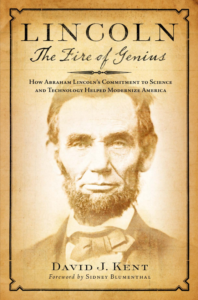 I was interviewed for the summer 2022 issue of The Lincolnian, the newsletter of the Lincoln Group of DC. This is Part 3, the final part. Here is Part 1 and Part 2. The focus was on my new book, Lincoln: The Fire of Genius. The interviewer was Wendy Swanson, editor of The Lincolnian.
I was interviewed for the summer 2022 issue of The Lincolnian, the newsletter of the Lincoln Group of DC. This is Part 3, the final part. Here is Part 1 and Part 2. The focus was on my new book, Lincoln: The Fire of Genius. The interviewer was Wendy Swanson, editor of The Lincolnian.
What’s next? Do you have plans/ideas for your next book?
I have several books in various stages of planning and writing. I’m currently scoping out a book version of my “Chasing Abraham Lincoln” blog series. The hope is to examine the soul of America through Lincoln.
And what’s next for the Lincoln Gp? Any thoughts on future events? What else do you want to accomplish during your presidency?
The Lincoln Group has a long history of promoting Lincoln scholarship and public education and modern communication options are helping us grow into a truly national organization. This coming year is the 160th anniversary of the Emancipation Proclamation, so I expect us to address that in several ways. The Group will also build closer working relationships with other Lincoln organizations in the area plus the DC school system. The country needs to learn from Lincoln, and the Lincoln Group is best positioned to help guide that learning.
Anything else you wish to add on these topics?
I was thrilled that Sidney Blumenthal agreed to write the Foreword for my book. He wrote an article on Lincoln and technology while my book proposal was circulating publishers, and his foreword is perfect for introducing the book. I was equally excited that many of Lincoln scholarship’s most renowned experts wrote back cover blurbs for me, including Harold Holzer, Michael Burlingame, scientist-turned-historian Ed Steers, former National Academy of Sciences historian Marc Rothenberg, James Cornelius, and several others. That support and confidence is extremely encouraging as the book finally makes it into stores.
Release date for the book is September 1st, but it is already available for pre-order at Rowman & Littlefield’s website, Amazon, Barnes & Noble, and all other book outlets. It’s available as hardcover and e-book (Kindle and Nook), with hopefully a paperback to come out next year. I’ve also seen it listed by booksellers based on Canada, the UK/Europe, and Australia, so you can probably find it on shelves or online if you live in any predominantly English-speaking country worldwide. My earlier books were translated into multiple languages (Tesla even got translated into Czech), so I’m hopeful Lincoln: The Fire of Genius will be as well.
Not part of the interview, but I often get asked: What’s next?
Right now, I’m preparing for quite a few upcoming presentations, as you can see from the list on my Media page. That includes keynote speeches in January, February, March, and April of 2023. I’ve also started traveling again. I went to Iceland in early July and am scheduled for a trip to Tanzania right after Thanksgiving. Meanwhile, my editor has expressed interest in getting to work on my next book. And, of course, there are plenty of Lincoln Group of DC events coming up (with more to be added soon).
Finally, a reminder: If you’ve read Lincoln: The Fire of Genius and liked it, please leave ratings and reviews on Goodreads, Amazon, Barnes and Noble, and elsewhere (you can copy and paste the same review if you want). It helps more people learn about the book and is very much appreciated by all authors.

Lincoln: The Fire of Genius: How Abraham Lincoln’s Commitment to Science and Technology Helped Modernize America was released on September 1, 2022.
The book is available for purchase at all bookseller outlets. Limited signed copies are available via this website. The book also listed on Goodreads, the database where I keep track of my reading. Click on the “Want to Read” button to put it on your reading list. Please leave a review if you like the book.
You also follow my author page on Facebook.
David J. Kent is President of the Lincoln Group of DC and the author of Lincoln: The Fire of Genius: How Abraham Lincoln’s Commitment to Science and Technology Helped Modernize America and Lincoln: The Man Who Saved America.
His previous books include Tesla: The Wizard of Electricity and Edison: The Inventor of the Modern World and two specialty e-books: Nikola Tesla: Renewable Energy Ahead of Its Time and Abraham Lincoln and Nikola Tesla: Connected by Fate.



 In
In  I was interviewed in the summer 2022 issue of The Lincolnian, the newsletter of the Lincoln Group of DC. The Lincolnian is sent to all Lincoln Group members quarterly (
I was interviewed in the summer 2022 issue of The Lincolnian, the newsletter of the Lincoln Group of DC. The Lincolnian is sent to all Lincoln Group members quarterly (






